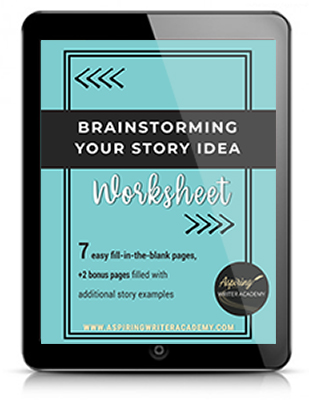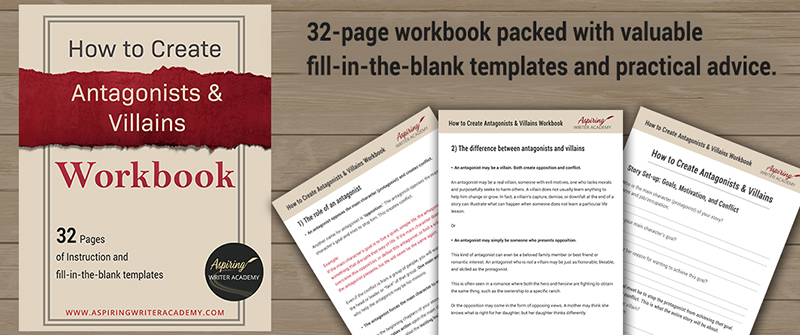How to Create S.M.A.R.T. Goals to Keep Your Writing on Track

Do you set goals with your writing only to have them derailed? Do you have trouble finishing a novel or with time management in general? How is an author supposed to maintain a personal life, do household chores, and write—publish—promote their stories without feeling overwhelmed or run ragged?
In our post, How to Create S.M.A.R.T. Goals to Keep Your Writing on Track, we show you how to eliminate frustration and hit the needed milestones to write and finish your fictional story.
What are S.M.A.R.T. Goals?
S.M.A.R.T. goals are specific, measurable, actionable, realistic, and timebound.
S = Specific, a goal with significant detailed focus.
M = Measurable, a goal with incremental milestones that can be checked off to chart your progress until the goal is reached.
A = Actionable, the goal can be broken down into smaller, achievable action steps.
R = Realistic, a goal that actually can be attained.
T = Timebound, a goal with a deadline, a targeted finish date.
Examples of S.M.A.R.T. Goals
I will write a 30,000-word novella within six months, finishing on May 31st. I will achieve this goal by writing from 9:00 am to 1:00 pm Mondays, Wednesdays, and Fridays.
Let’s take a look at this example. ‘I will write’ focuses on the positive – what you will do, not what you won’t do.
Is writing a 30,000-word novella within six months, finishing by May 31st specific? Yes, it is detailed with facts and figures, certainly not vague.
Is it measurable? Yes, the goal can be broken down into writing 5,000 words monthly until the goal is reached. Each month you can see how far you have come and how far you still need to go to finish your fictional novel.
Is it actionable? Yes, but to achieve writing a 30,000-word novella, a writer must actually write. Breaking the writing process down into manageable chunks, such as 5,000 words a month or 1,250 words a week create mini milestones that you can use to chart your progress.
Is this goal realistic? It may be realistic for another writer, but is this goal and timeframe for finishing a novella realistic for you? If you are caring for small children or an elderly parent, or going on a two-week vacation, or are committed to organizing the big charity event for your community during this timeframe, then you must consider whether your goal is realistic or wishful thinking. The ‘R’ in the S.M.A.R.T. goal acronym can also stand for ‘Relevant.’ Is writing a 30,000-word novella the right goal for you at this moment of your life considering your overall goals as an author? Does the theme of this novella really resonate with you or are you writing this story only because it’s the newest popular trend? If your heart isn’t in it, you will have a hard time finishing the story.
Is this goal time-bound? Yes, there is a specific deadline. The novella will be finished within 6 months, by May 31st. This is the date by which the goal must be achieved.
The next line tells how the goal will be accomplished—by writing from 9:00 am to 1:00 pm Mondays, Wednesdays, and Fridays. This is very important, because you must have a plan to achieve this goal. When will you sit down and write? This information could go under the Actionable acronym. You need to not only be specific on what you will write and how many pages, scenes, chapters, or words, but you need to be specific on how you plan to make this happen.
Will you write mornings, getting up at 5 am? Or are afternoons between 2:00—5:00 better for you? Or perhaps your best writing time may be at night when the house is quiet and the children are all asleep in their beds?
Schedule your writing time on your calendar just as you would an appointment. Keep this appointment with yourself. This is your time to write and achieve a goal that can make a real difference in your life! Do not let friends entice you to sacrifice your writing time with offers to go to lunch. Tell them, “Sorry, I have an appointment that cannot be rescheduled.” However, if a true emergency interrupts your schedule, then also schedule ‘catch up’ blocks into your schedule so that you will not fall behind. Perhaps stay up extra late one night to catch up on a block of writing time that you missed. But do not make this a habit! Keep to the schedule and give yourself rewards for doing so to make it more enticing.
Let’s look at another example:
I will write a 65,000-word mystery novel with eighteen chapters within nine months finishing on September 30th. To achieve this goal, I will write five days a week from 8:00 am to 4:30 pm, taking 30 minutes each day for a lunch break. I will need to write 2 chapters per month, which means 1 chapter every two weeks, 2 scenes each week. This will realistically leave enough time each week for me to also conduct research and line up promotion opportunities for when the book is finished.
Does this seem like a S.M.A.R.T. goal? Is it specific, measurable, actionable, realistic, and time-bound? Yes, it is.
Will the author achieve this goal? Yes, it is very possible that if the author sticks with this game-plan, the 65,000-word mystery novel will be written by the intended deadline.
However, when creating goals, part of being realistic is seriously considering how much you can handle both physically and mentally. If writing this novel is the sole focus of the author’s life, there should be no problem. But if this author also works the nightshift at the local shipyard, coaches football on Saturdays, then catches up on chores and spends time with his family on Sundays, he may wear himself out. This author may find his writing schedule is not sustainable, not for lack of a plan but because he does not have the mental or physical stamina to keep going. This author may experience ‘burn out’ because he is trying to do too much.
The challenge of every writer is to find balance.
How S.M.A.R.T. Goals Can Work for You
S.M.A.R.T. goals can keep you on target to achieve almost any goal in your life. Sounds great, right? But can you really do it?
While you are creating S.M.A.R.T. goals for your writing, also use the S.M.A.R.T. goal system to create goals for other important areas of your life and make sure they do not conflict with one another. This is KEY to making sure you are setting goals you can actually achieve!
Don’t let another year go by where your book did not get written!
- Write S.M.A.R.T. goals for your finances, your health, your family and personal life, as well as your writing. How will you schedule each of these focus areas into your weekly calendar? Are there any activities or commitments that are not serving you or your goals that you can stop completely or cut back on?
- Prioritize! What is most important to you? What must be done?
- Focus! What writing goals do you want to achieve?
- How will you make achieving those goals possible?
- Does your game-plan include some days off or enough downtime, so you do not experience burn out?
- Chunk each goal down into smaller, manageable action-oriented blocks.
- Instead of setting goals for an entire year, try setting 90-day goals (3 months at a time), so that if you need to re-adjust your writing schedule or timeframe for your other goals you do not go too far off track. Shorter timeframes for achieving goals also provide more opportunities to celebrate victorious ‘wins’ which in turn, keep you motivated for the next 90 days. If you need to write a 75,000-word fictional novel in 9 months, how many words do you need to write within the first three? (25,000 words in 90 days, unless you have reserved the first month in your S.M.A.R.T. goal writing plan for research.)
- Also try to chunk down your writing goals even further into WEEKLY goals. First take your entire writing goal and map out the first 90 days, then break those down into smaller monthly or even weekly action-plans. Weekly plans are good because it allows some wiggle room. If you mess up one day, you can make up for it the next and still achieve your weekly goals. The more focused your schedule, the more apt you are to achieve your 90 day and over-all writing goals.
- Use S.M.A.R.T. goals for your marketing and promotion plans once your fictional novel is finished.
- Use S.M.A.R.T. goals to map out your career plan. What will you do each year for the next 5 to 10 years to ensure success? How many books will you write? Which conferences will you attend? Which courses will you study to advance your writing? To which publishing houses, editors, or agents will you submit a book proposal?
Make this the year that you finally make progress with your writing and produce finished novels!
With the S.M.A.R.T. goals system, you can see exactly where you are on the road to achievement. Get ready to celebrate each milestone ‘win!’
Imagine the joy, the self-satisfaction you will feel when you hold your finished book in your hands for the first time.
Use S.M.A.R.T. goals for writing, marketing & promotion, career plans, and for your personal life and excel in ways you never thought possible.
We hope you have enjoyed How to Create S.M.A.R.T. Goals to Keep Your Writing on Track and that you have gained some valuable tips to maintain momentum as you write and finish your short story or fictional novel.
If you have any questions or would like to leave a comment below, we would love to hear from you!
If you like more help developing your story, you may wish to download our Free Brainstorming Your Story Idea Worksheet
Do you find it difficult to create compelling antagonists and villains for your stories? Do your villains feel cartoonish and unbelievable? Do they lack motivation or a specific game plan? Discover the secrets to crafting villains that will stick with your readers long after they finish your story, with our How to Create Antagonists & Villains Workbook.
This 32-page instructional workbook is packed with valuable fill-in-the-blank templates and practical advice to help you create memorable and effective antagonists and villains. Whether you're a seasoned writer or just starting out, this workbook will take your writing to the next level.
Our Goal for Aspiring Writer Academy is to help people learn how to write quality fiction, teach them to publish and promote their work, and to give them the necessary tools to pursue a writing career.

ENTER YOUR EMAIL BELOW
TO GET YOUR FREE
"Brainstorming Your Story Idea Worksheet"
7 easy fill-in-the-blank pages,
+ 2 bonus pages filled with additional story examples.
A valuable tool to develop story plots again and again.
Other Blog Posts You May Like
How to Find a Writing Group: Tips for New Authors
Why We Started Aspiring Writer Academy: Our Story
50 Top Resource Books for Fiction Writers
3 Levels of Goal Setting for Fiction Writers
Fiction Writing: Office Supplies to Help You Prepare to Write Your Next Novel
Fiction Writing: 5 Key Differences Between a Novel and a Novella
Write Your First Novel: How Do You Start?
Do You Dream of Being a Published Author? (How Bad Do You Want It?)
Who is an ‘Aspiring Writer?’ 3 Tips to Escalate Your Career No Matter What Level You Are At
How to Write the Midpoint of Your Novel (and Avoid a ‘Saggy Middle’)
20 Items to Bring to Your First Writer’s Conference
How to Find a Great Story Idea in 4 Easy Steps
How to Write a Novel While Working Full Time
Slingshot Week: How to Set New Goals for Writing in 2023
The Pros and Cons of Writing Holiday Fiction (Collections & Anthologies)
Fiction Writing: How to Find a Critique Partner/Group

is a multi-published author, speaker, and writing coach. She writes sweet contemporary, inspirational, and historical romance and loves teaching aspiring writers how to write quality fiction. Read her inspiring story of how she published her first book and launched a successful writing career.



























